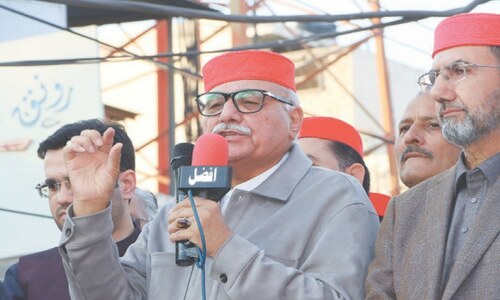PESHAWAR: Delayed execution of development projects and the repeated changes and revisions in their plans have caused Khyber Pakhtunkhwa’s public exchequer well over Rs25 billion in cost overruns, according to the official data.
The data available with Dawn reveals that there are at least 99 development projects belonging to 15 socio-economic sectors that have recorded whopping increase in their completion costs due to revisions in their plans.
“Don’t ask! Incompetence is rampant. Seldom, anybody has been acted against for failing to implement projects as per plans,” said a development planner associated with a public sector entity.
The revisions under project plans result into expansion in projects’ lifecycle and escalate projects’ completion costs, according to sources. The cumulative approved cost of the 99 development projects that have undergone revisions, according to the data, was Rs20.95 billion.
However, after the revisions, these projects would now be completed at a total cost of Rs46.3 billion, costing the provincial public exchequer dearly.
In one particular case belonging to the provincial transport department a project has undergone revisions for seven times.
Against the initially approved cost of Rs79.72 million, the project would now complete (if it completes in time and as per plan) at Rs362.6 million.
Usually, the public sector projects are replete with poor time and costs estimates, infected with improper planning, san properly identified risks and effective mitigating factors to overcome these risks if they do happen, and delays in the release of funds and approval of the project plans.
Some 62 of the projects, according to the data, have undergone revisions at least once, 22 projects have been revised twice, 6 projects have experienced revisions for three times each, and there are three projects that have undergone revisions more than three times each.
Only the health sector projects would cost the provincial kitty a total addition amount of Rs11.2 billion, the water sector Rs4.3 billion, roads Rs4.7 billion, regional development Revision of projects costs KP dear Rs1 billion, the industries department more than Rs990 million, the urban development sector Rs788 million, the high education department Rs662 million, the finance department Rs548 million, and science and technology and information technology department Rs348 million.
An official said that the issue also came under discussion at a high level meeting with the chief minister in the chair.
However, while the phenomenon is a common knowledge among the official circles, serious efforts are lacking on the provincial functionaries to overcome the problem.
“Nobody is bothered about the cost escalation recorded by the under construction Mufti Mehmood flyover at Peshawar,” said a planner, adding the project had been revised more than twice.
“Each time a project is revised its costs escalates, which benefits private contractors and their accomplices from among the official circles,” said another development planner. He said the under construction block behind the Planning and Development department at the civil secretariat, Peshawar, could not be completed for the past four years. “No one cares, because the money is being paid from the public exchequer,” said the official.
Of the 99 development projects that underwent revisions over the past few years, most i.e. 22 belong to the water (irrigation) sector, followed by 13 to the health department, 11 to the higher education department, nine to the industries department, eight to science and technology and information technology department, six each to the roads and regional development departments, five to the building sector, four to the agriculture department, three each to the drinking water supply schemes/finance department/and transport department, two to the mines and mineral department, and one to the information department.
The problem of costs overruns due to revising project plans is not limited to the provincial government’s development projects only. The federally funded public sector development programme is also infested with the problem. In a recent letter to the provincial governments, the federal government has asked them to provide the lists of all PSDP funded schemes that involve time and costs overruns.According to official circles, the problem of revisions/delays in projects is likely to compound in the near future as the existing annual development programme has hundreds of schemes that are fraught with delays.
The provincial government, according to sources, has a gigantic task at hand to utilise the ADP funds by 100 per cent during the remaining four months of the fiscal.
“Spending money is one thing, and spending it by exploiting its utility is a different matter,” said an official.
He said the successive governments had been focused on judging the ADPs’ performance by analysing the money spent at the close of each fiscal.
The official said no one analysed how much the ADP projects had been effective to fulfil the purpose for which they were planned.











































